Overview
The example explained in this document is depicting a Contract management unstructured process, where any sort of contract can be driven from its request to its expiration. Since a process to thoroughly manage any kind of contract would have to consider an enormous number of situations, this process approach is rather general, relying in the tools offered by Bizagi to manipulate every case and task differently.
Scope: The process starts when a contract is required and a Contract owner creates a request which, with assessment of internal employees and defined participants (acting as representatives of the other parties of the contract), results in a released contract. Any modification to the status of the contract is supported, as well as meeting alarms and tracing. Nonetheless, this process does not support direct management of the document itself, namely terms and conditions, policies, constraints, etc.
As mentioned before, this process heavily relies on the use of Bizagi 11 features options, taking advantage of the Experience Design concept to depict an unstructured process.
Unstructured processes are those which you may catalog as highly unpredictable or dynamic, mainly because these processes may involve, at some point, a very large number of possible workflow alternatives.
It represents how the Personas (knowledge workers) are able to make decisions to define the flow of a case, that cannot be predicted beforehand.
The scope of the Contract management case is the assessed release of a contract and the control of its meetings and status changes.
Through Experience Design you will be able to make the most of: Empowering knowledge workers, presenting a personalized user experience, and using contextualized BPM capabilities, among others.
Bizagi Modeler Process Description (Bpm)
The complete documentation of this process can be found within its Bizagi Modeler file (.bpm). From there, you can generate a Word document with all its information.
Identify the general process and milestones
Identify the general process, or happy path, providing a high level business description of what will be automated. Identify the most common outcomes (in this first stage do not include exceptions) and the stages of the case, or milestones.
The milestones of a Bizagi Contract management process are:
•Creation of a Contract request
•Internal assessment, approval and consent of the draft.
•Participants’ assessment and approval of the draft.
•Contract release and digital copy storage.
•Contract status update.
Not all milestones will have to be reached in a case instance. In fact, several are mutually exclusive. Some may be revocable: even when the milestone has been reached, the case Personas can decide that on second thoughts it is not reached after all. Furthermore, some milestones are not part of a case, but actions performed regarding the information of the contract request.
Bear in mind that the intention of every released contract is to be used by other processes, in other words, to properly control available contracts.
The statuses defined for each contract are defined in the table below:
Status |
Description |
Possible next status |
|---|---|---|
Draft |
The contract is being reviewed, and is unsigned. |
Cancelled |
Renewal |
A previous contract has been taken as a base. The contract is being reviewed, and is unsigned. |
Cancelled |
In Negotiation |
The contract is being negotiated with third parties. |
Cancelled, Released |
Released |
The contract has been signed and is currently active. This means it is available to be referenced in other processes. |
Expired, Cancelled, Locked |
Locked |
The contract is currently unavailable, despite it has not expired. |
Expired, Cancelled, Released |
Expired |
The contract validity has expired, or the header target value is exceeded. |
|
Cancelled |
The contract has been terminated before its term ending. Therefore, is not available anymore. |
Personas
Bizagi 11 presents a Work portal which allows knowledge workers to make informed decisions, such as when to start a process or update data, boosting agility and productivity.
Various Personas can be associated with the case. However, each Persona may directly or indirectly influence the case. Not all Personas listed have to be involved with every instance of the case.
Identifying Personas is important to be able to personalize their experience.
-Consenter
-Contract Owner
-Legal Area Employee
Experience design
In Bizagi Studio each Persona has their experience designed in the Experience Designer menu. Each tab (Actions, My Stuff, Search) has a definition according to each user’s available options.
Keep in mind that to enable a group to be available in My Stuff section, the Persona must have a Direct or indirect collection to an entity.
Thus, the Contract Owner for instance, has a collection to ContractManagement. That way, each contract owner will own one or more contracts, and will be able to view them in the Work portal, and manage them if there are actions available to manage them.
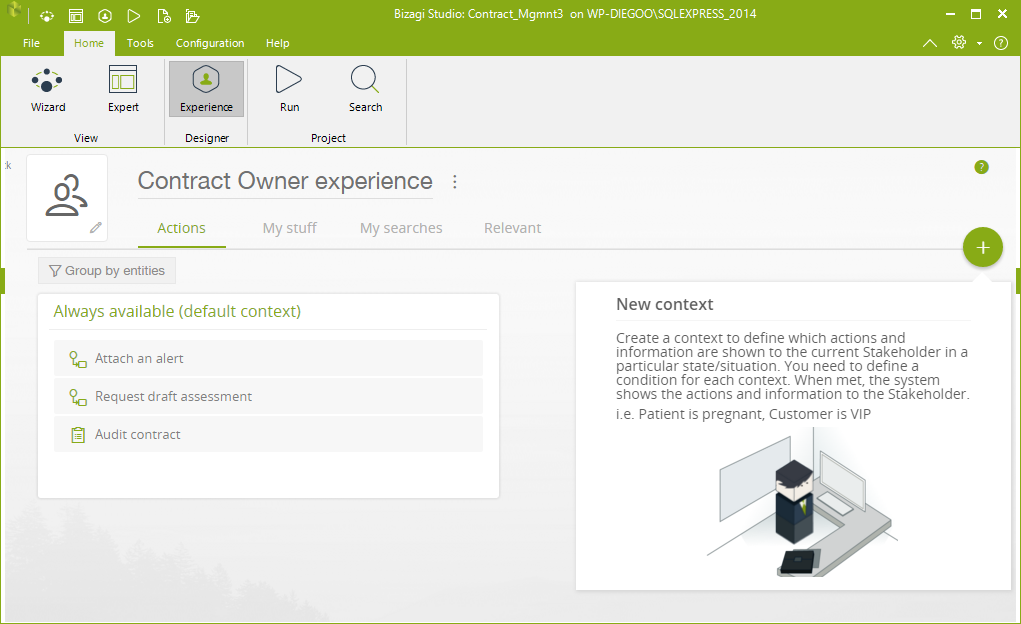
Contract Owner experience design
Manage Personas
As you download this template, make sure you have created at least one user per Persona and have configured them in the Admin option of the Work Portal. If you don`t have one user per Persona, this template will not work.
Go to the Admin option and for each Persona create a new record, by creating a new user and filling in all additional required information.
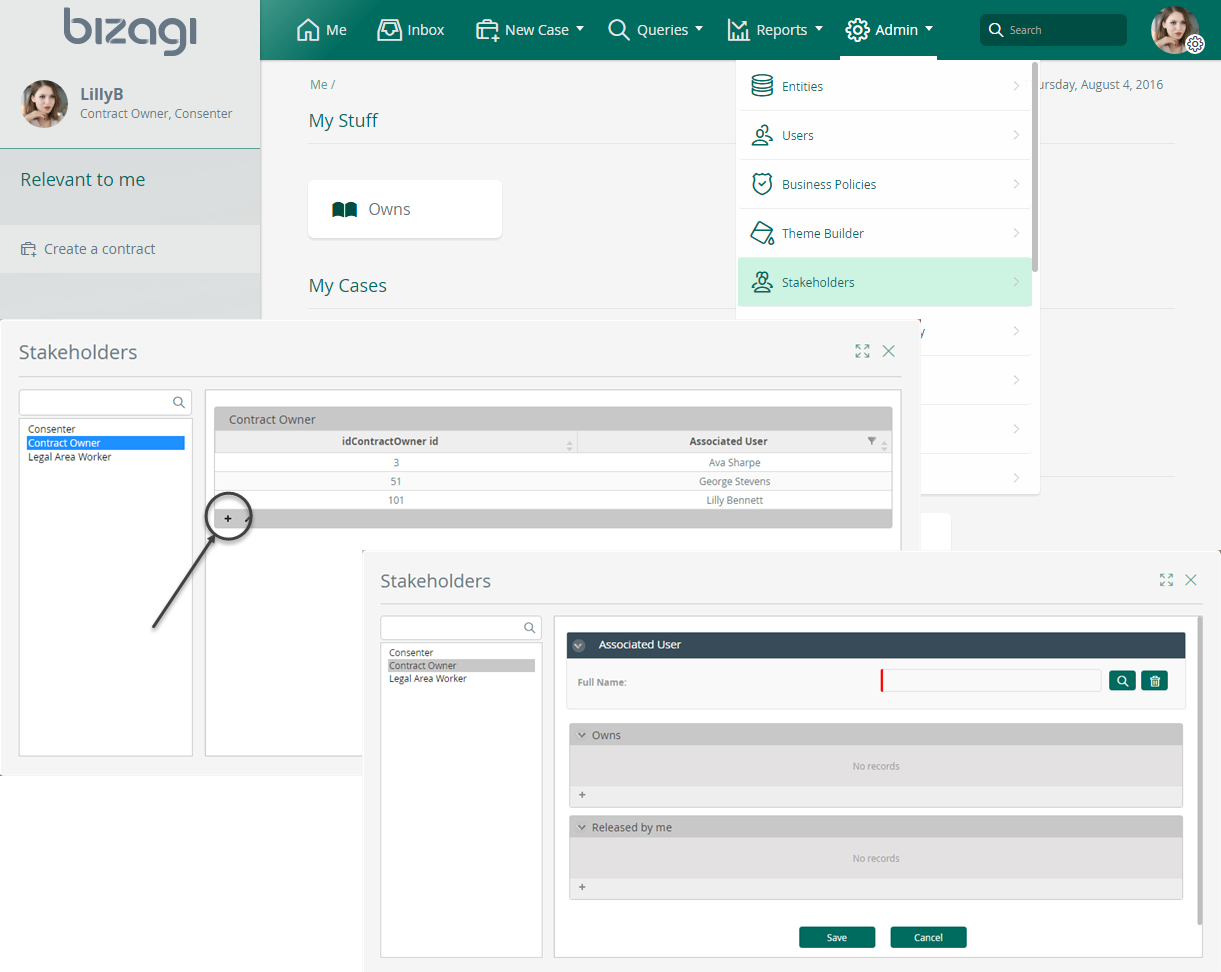
Keep in mind that to manage Personas in the Work Portal we have already defined the management forms for them. These forms will display what information to be shown and requested when configuring a user as a Persona.
In Studio we defined a Display form that depicts the columns of the Persona’s main view.
And an Add and Edit form, that relate how a Persona record is added and edited.
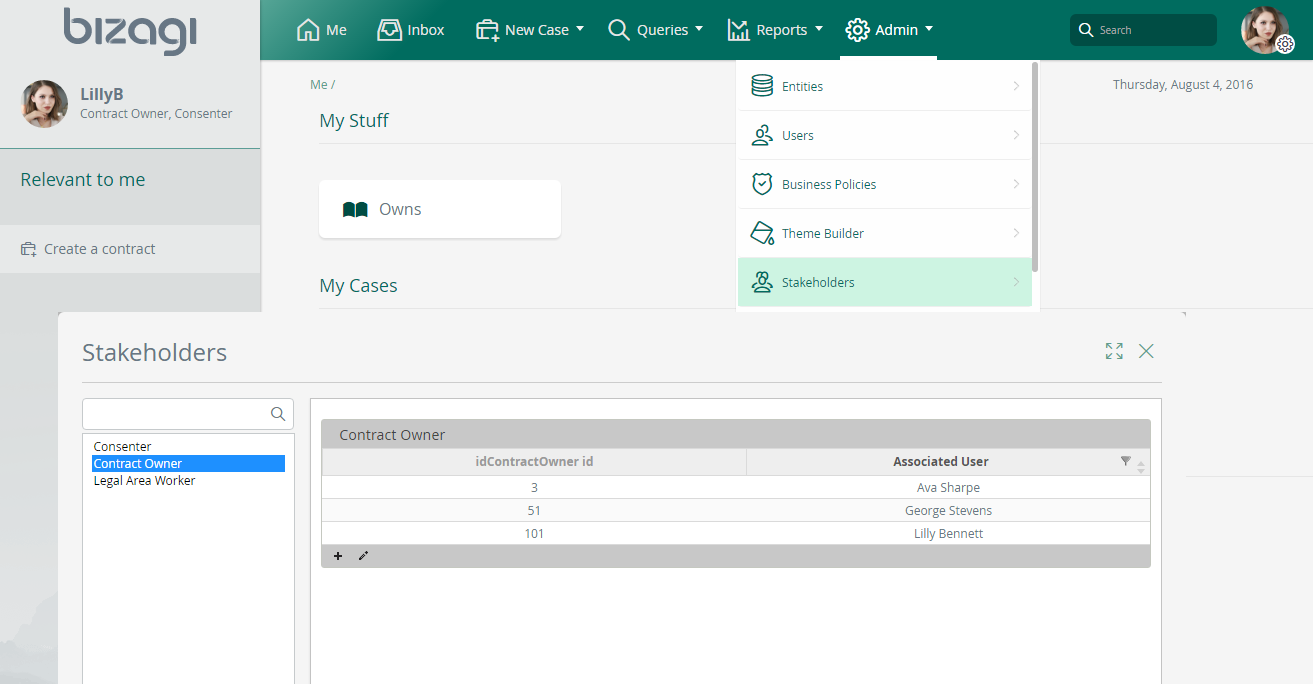
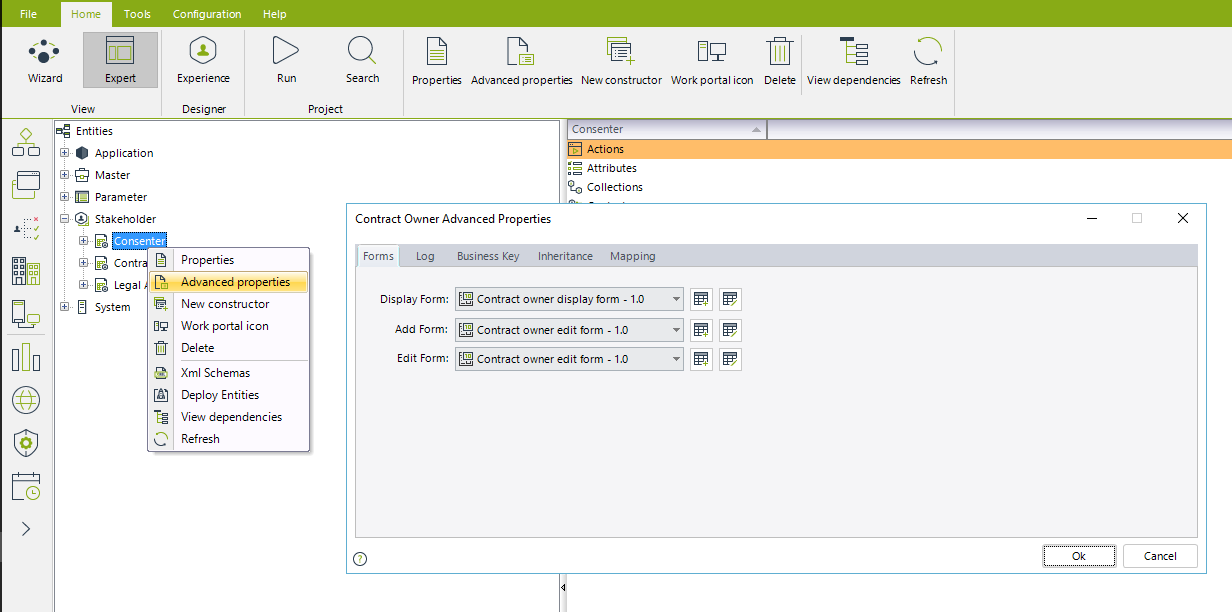
Identify Activities, what Personas can do
This involves the activities the Personas can initiate and other case related operations they can perform, categorizing their allowed interactions with the Work portal that will be enabled for them.
Defining if Activities are mandatory under certain circumstances or are available but executed at the Persona’s discretion will help categorize an activity as an Action available as part of an unstructured process.
Many activities in a case are not always available for execution. Only when certain milestones are reached in the case or specific conditions are met, will the activity be applicable. Activities can be withdrawn: when they are no longer relevant, they should not be presented to Personas.
Persona |
Activity description |
When can this action/activity be performed |
Comments |
|---|---|---|---|
Contract Owner |
Create a contract |
Anytime |
|
Request an assessment |
When authoring the contract. |
||
Register other parties’ feedback |
When evaluating the contract. |
||
Release contract |
Once the contract is approved. |
||
Attach an alert |
Anytime |
Creates a new Contract tracking case. |
|
Audit contract |
Anytime |
||
Consenter |
Give consent |
Once all requested assessments are approved for the current contract version. |
Only available for the case creator and the legal representative. |
Audit contract |
Anytime |
||
Search contracts |
Anytime |
||
Legal Area Employee |
Save a digital copy of the signed contract. |
Once the contract is signed. |
|
Update status |
Anytime |
Depending on the contract status, the next status options might vary. |
|
Audit contract |
Anytime |
||
Search contracts |
Anytime |
Identify Actions, Activities, Contexts and Data
Contract Owner
Activity description |
Context |
Availability |
Action / Activity |
|---|---|---|---|
Attach an alert |
Always available |
Through a search or My stuff. At discretion. |
Action: Starts a new Contract tracking process. |
Request draft assessment |
When authoring a contract |
Mandatory |
Action: Starts a new Assess contract case. |
Audit contract |
Always available |
At discretion |
Action: Displays a form regarding the contract information. |
Data description |
Context |
Availability |
Action / Activity |
|---|---|---|---|
Contract Management |
Always |
Via My stuff |
Action: Opens a form to audit the contract request log. |
Consenter
Activity description |
Context |
Action / Activity |
Activity description |
|---|---|---|---|
Consent a contract version |
When a contract is approved internally, is ready for consent. |
Mandatory |
Activity: Draft Authoring |
Audit contract |
Anytime when searching contracts. |
At discretion |
Action: Displays a form regarding the contract information. |
Data description |
Context |
Availability |
Action / Activity |
|---|---|---|---|
Contract Management |
Always |
Via My stuff |
Action: Opens a form to audit the contract request log. |
Legal Area Employee
Activity description |
Context |
Action / Activity |
Activity description |
|---|---|---|---|
Consent a contract version |
When a contract is approved internally, it is ready for consent. |
Mandatory |
Activity: Draft Authoring |
Audit contract |
Anytime when searching contracts. |
At discretion |
Action: Displays a form regarding the contract information. |
Update status |
Anytime when searching contracts |
At discretion |
Action: Starts an update contract status process. |
Processes Description
After reviewing the actions available, we can create the structure of a core process and processes that will be launched via Actions to support the case structure.
The process starts with a contract requirement. An authorized employee, as a Contract Owner, makes a contract request. Every request has a group of participants, which are external representatives of third parties implied in the contract to create; these are included in the request as well as contract type and a base contract to start working from it.
Once the contract is requested, it becomes a draft and a new version is automatically generated. Nonetheless, if the request is defined as a renewal, the “Draft” status will be replaced for “Renewal”.
When editing a draft, some assessments must be required to the members of the same company. If someone does not approve the contract version, a new version ready for edition is assigned to the contract owner. On the other hand, when the contract version is accepted, a consent from the contract owner and the legal representative of the company is mandatory before sending the draft to each participant (other parties representatives).
As soon as both consents are given, a notification to each participant is sent and various events become available for the contract owner to register the version’s feedback and approval or rejection.
Bizagi automatically checks if all participants have approved the version to continue with the contract signing and release. However, if the version was not approved by at least one participant, a new version of the contract is created ready to be edited by the Contract owner.
After it is approved, a Legal Area Employee must save a digital copy of the signed contract and the Contract owner must set the contract as “Released”. While releasing it, the contract owner can, as well, initiate alarms regarding the current version.
When released, the Contract request process is finished. Thus, every modification to the status or alarm attachment has to be done by the Legal Area Employee through Bizagi actions. These actions can be accessed using a search over the contracts.
Any alarm, which can be defined through Bizagi actions, will raise awareness about the meeting date for every party involved, and if a meeting result ought to be registered, the feedback will be stored using a connector to register it in Evernote.
Each contract will always display an action to show its request information and every status change detailed, an action to change its status (Varies per the current contract status), and an action to attach an alert (which starts the Contract Tracking) process.
Main process: Contract Management
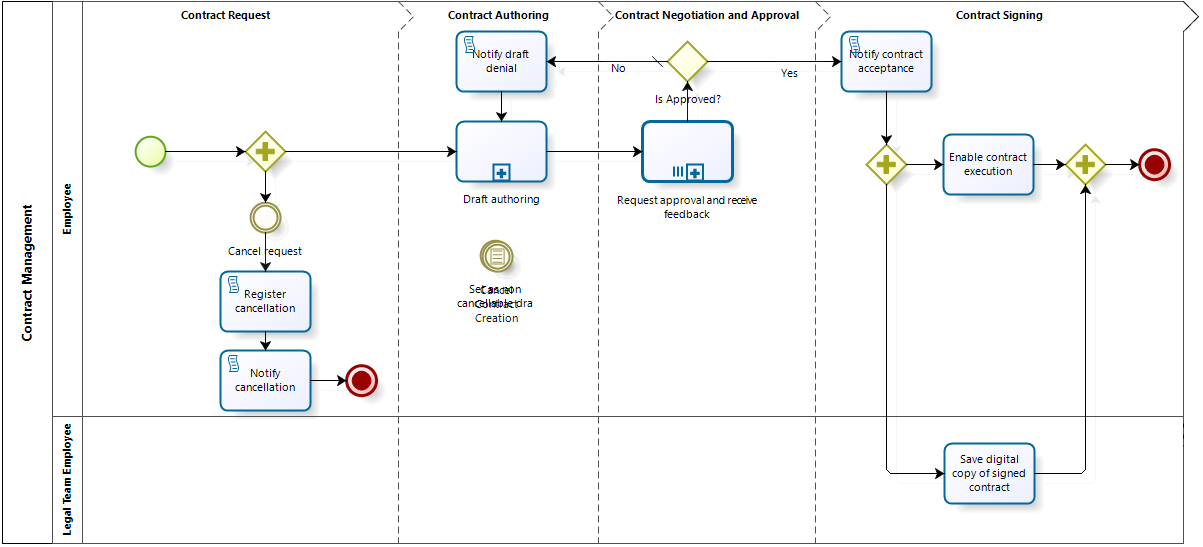
Sub-processes: Assess Draft

Sub-processes: Assess Draft
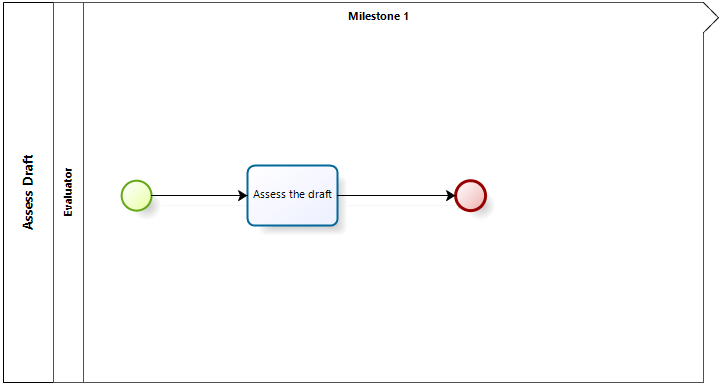
Sub-processes: Request approval and receive feedback
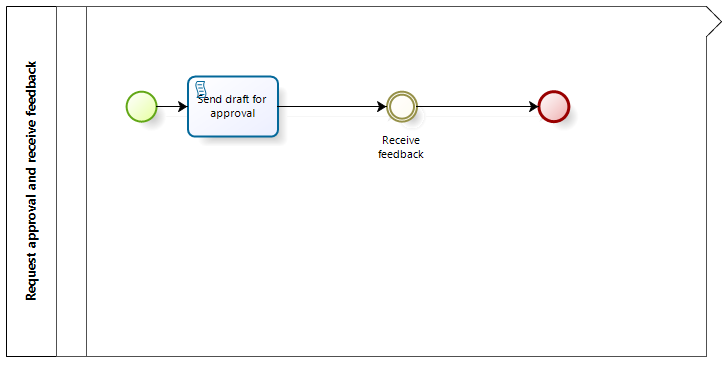
Other processes (supporting processes for unstructured management):
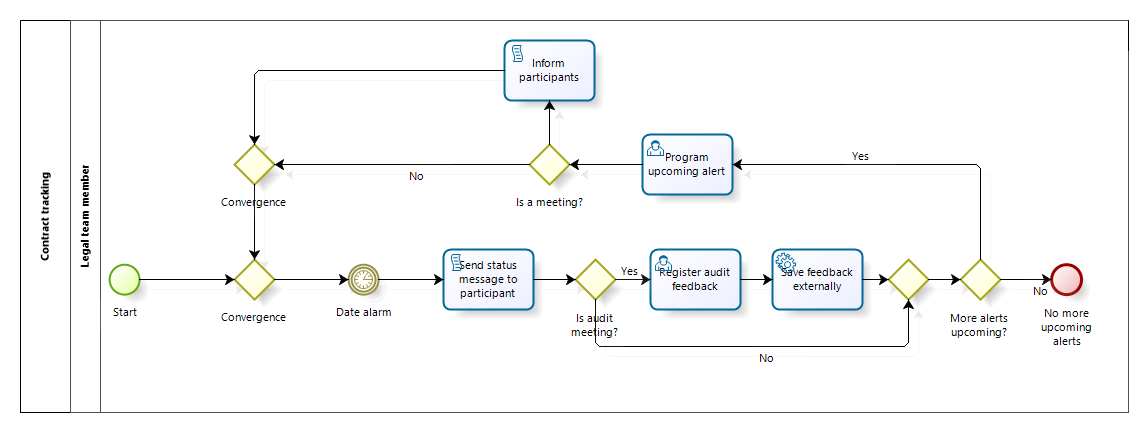
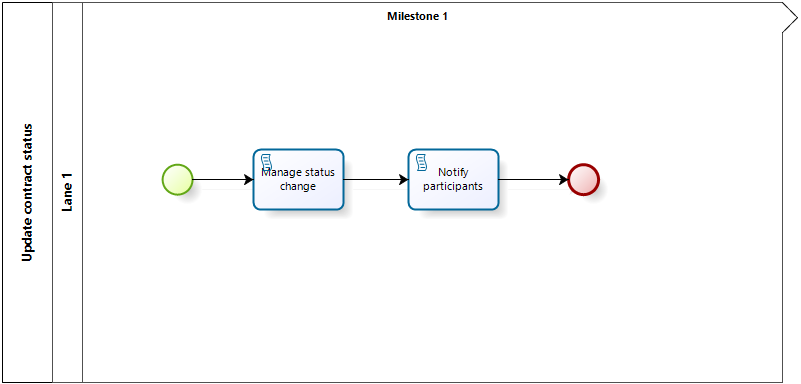
Figure 1:
Main facts in the Process Construction
Data Model
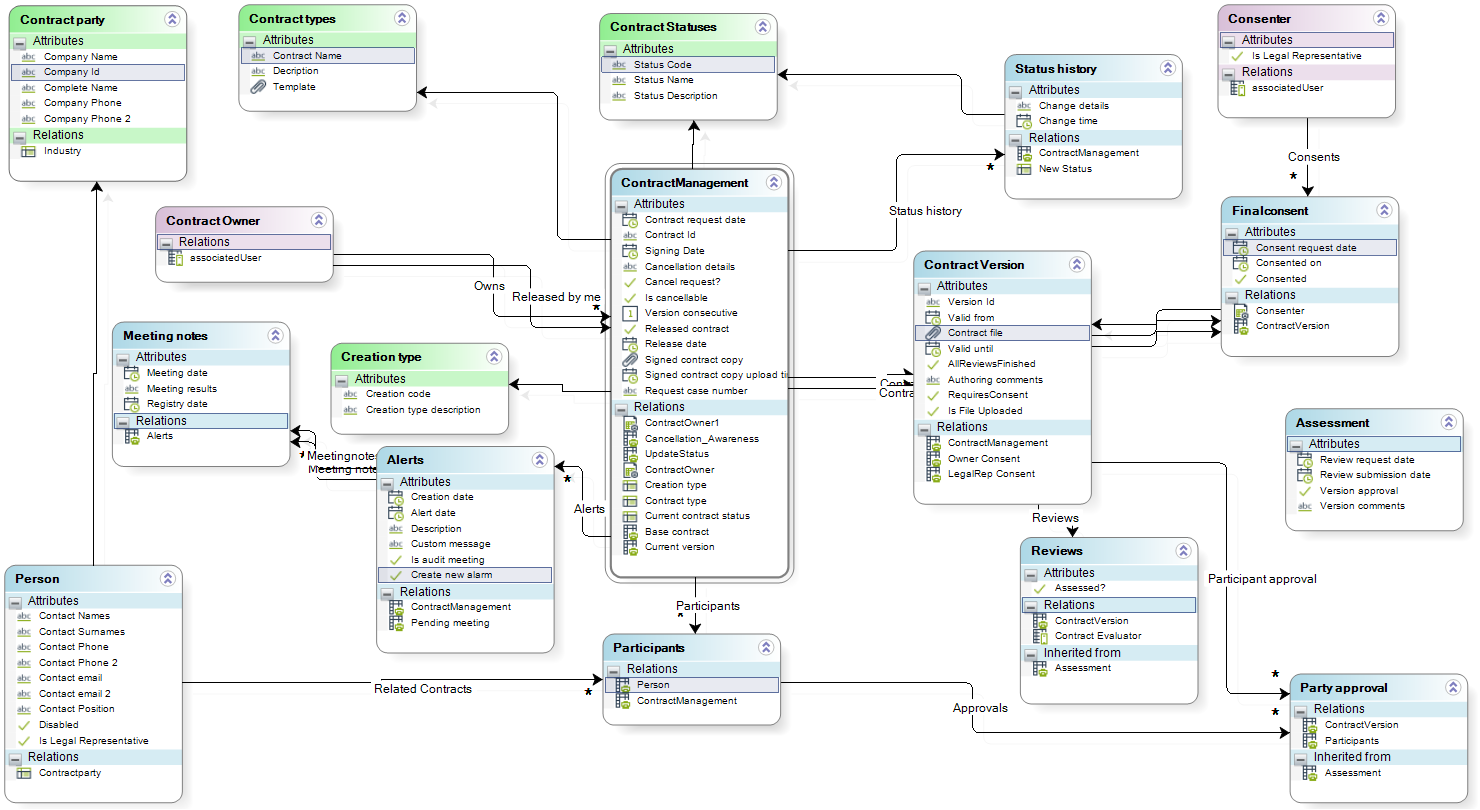
The process entity of the Contract management process is “ContractManagement” which has all the attributes and relationships necessary to save main case information.
There are three Personas created, that have their Experience designed to give a unique Work portal for each one:
•Contract Owner
•Consenter
•Legal Area Employee
Heritage configuration
Two types of assessments are done to the contract: internal assessments and third party assessments. Accordingly, there are two entities which inherit from the Assessment entity: Reviews and Party approval. Each of them is a process entity for its independent review process (Reviews is the process entity of the Assess Draft process and Party approval is the process entity of the Request approval and receive feedback process).
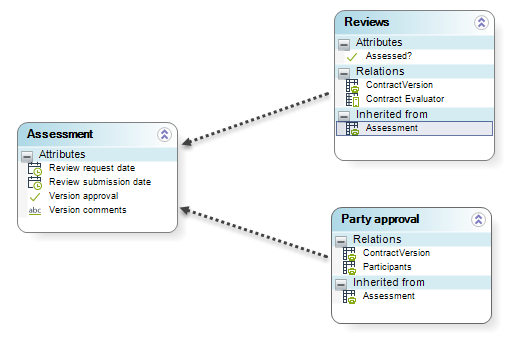
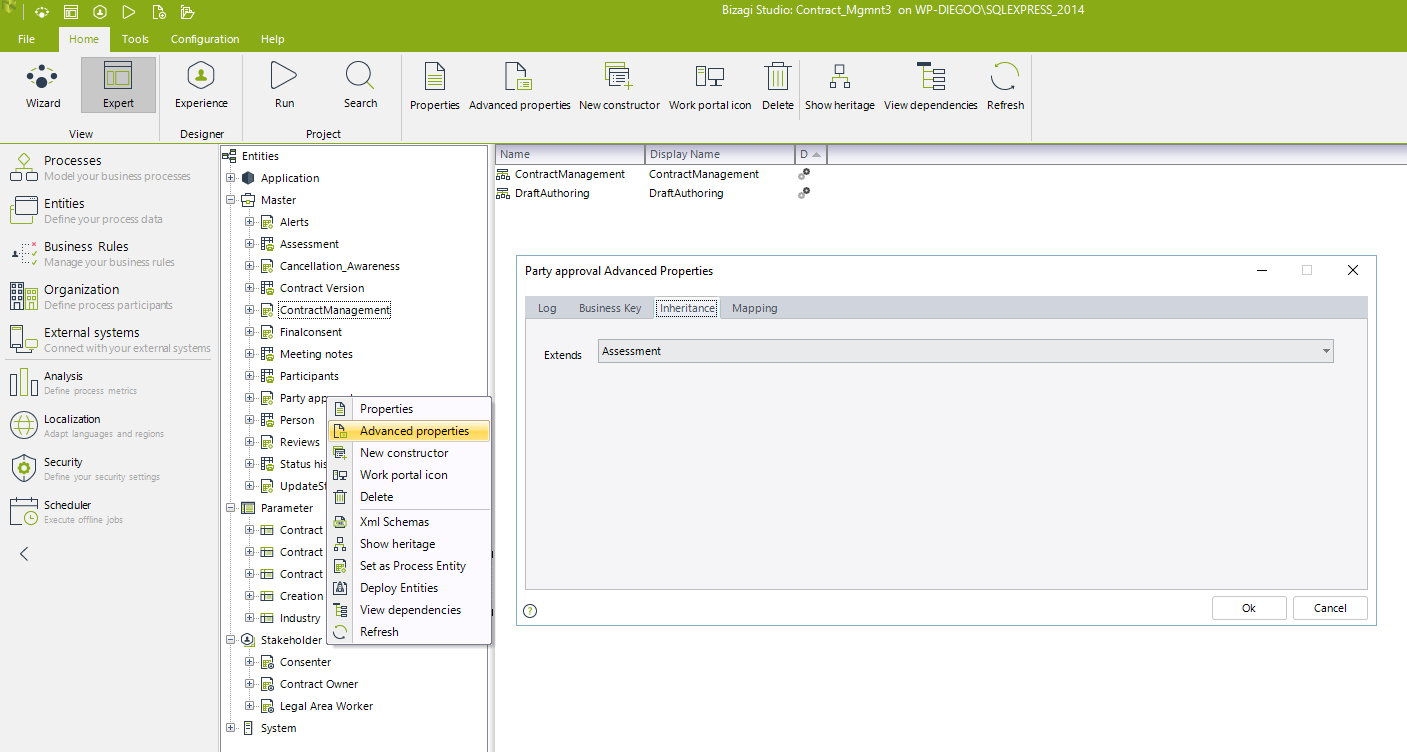
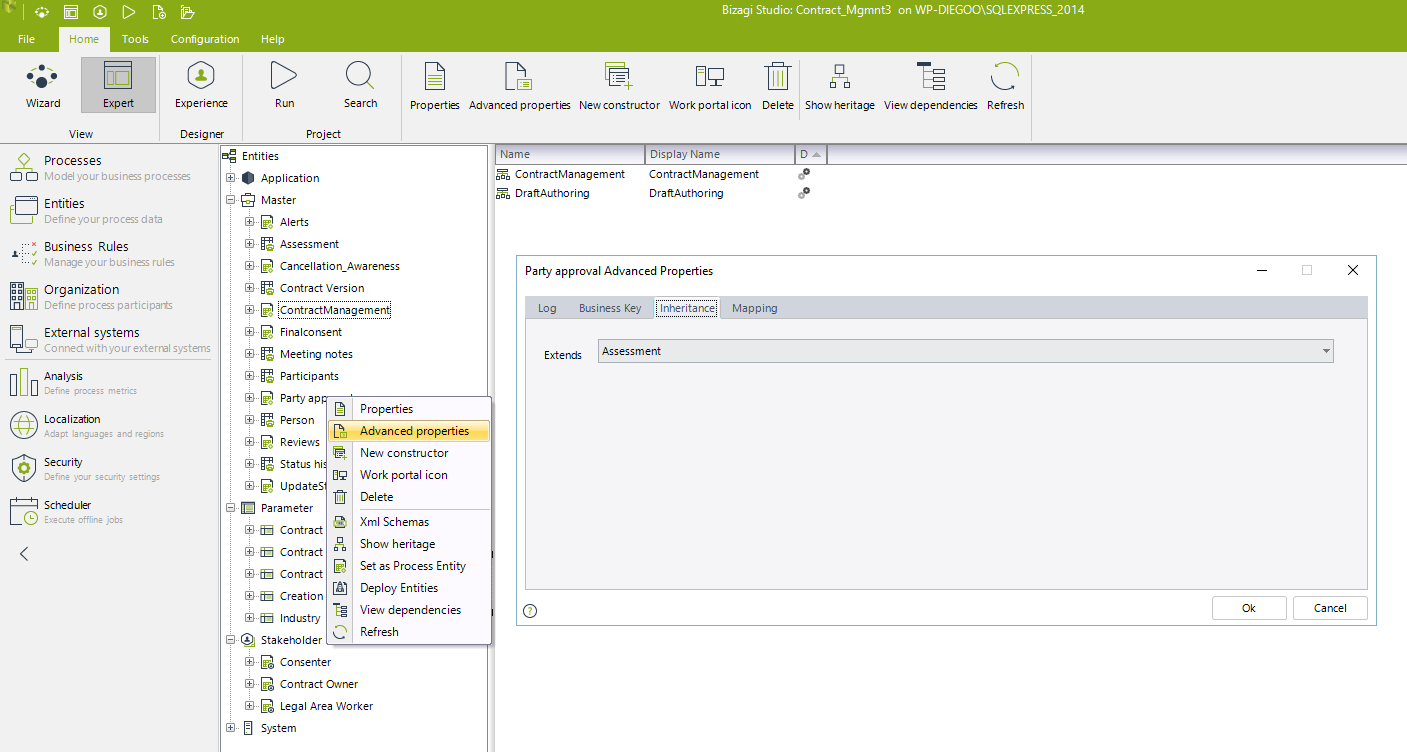
Templates
When browsing over data, either regarding results of data searches or lists of information which are part of My stuff, you may customize the information displayed for these resulting records.
By default, Bizagi uses a basic template that chooses random attributes of the entity to which a record belongs to.
We have defined data templates for the most relevant entities: Contract Management and Person.
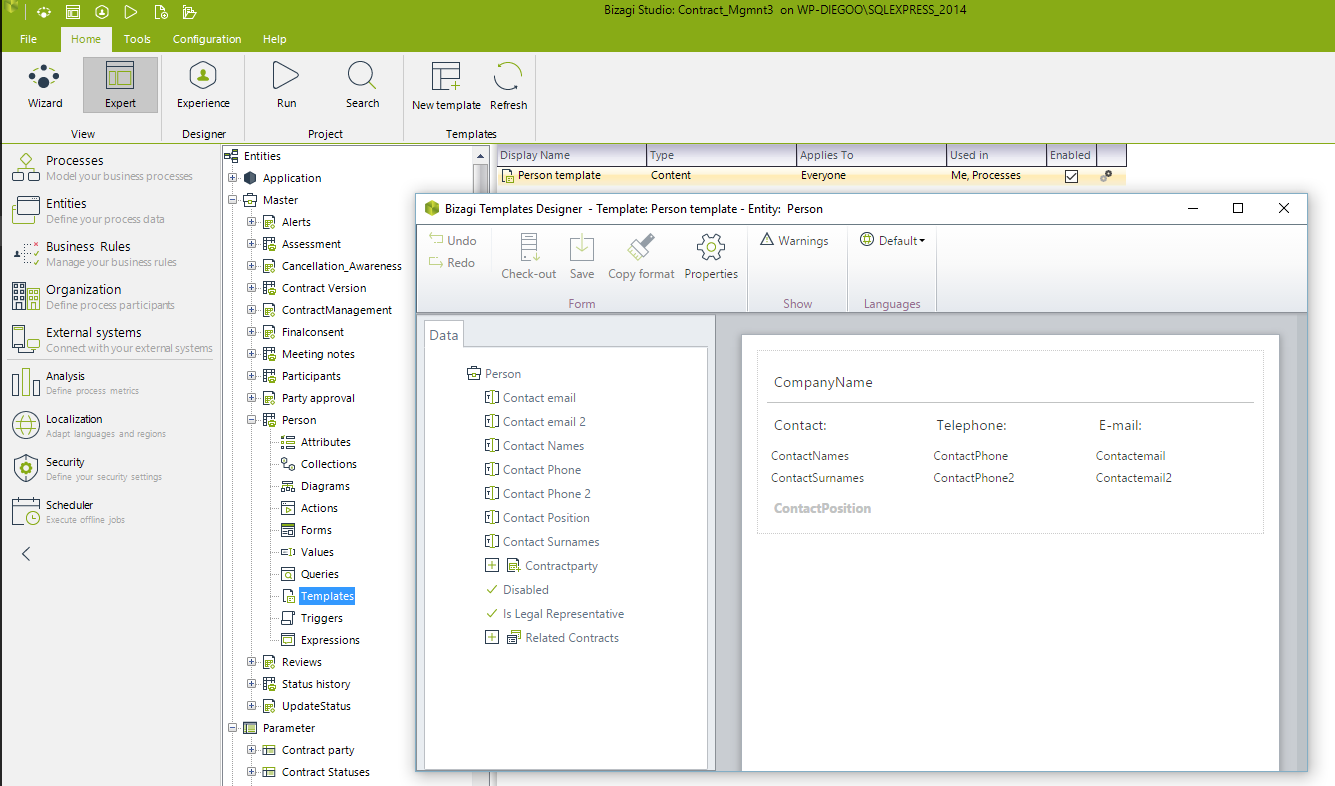
Triggers and Conditional activities/events
Conditional activities are used in processes to enable or disable activities according to a data condition in the process. In this template, we use the “All approbations finished” event:
When all assessments are finished, the All approbations finished” event should be enabled, but not before.
The condition to enable or disable the conditional activity is set in the fourth step of the process wizard, Define Expressions, as show below.
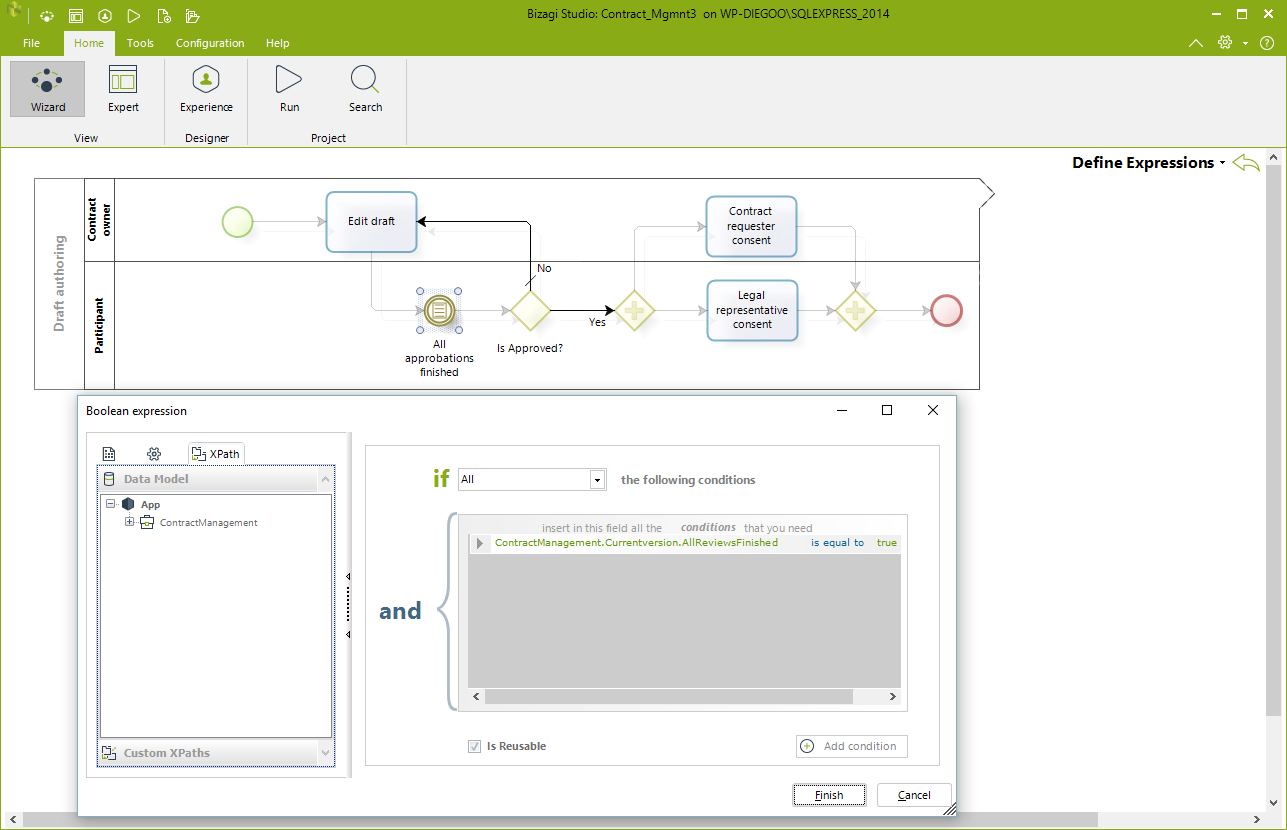
To set the ContractManagement.Currentversion.AllReviewsFinished attribute to true or false and thus enable or disable the activity, we use a Trigger.
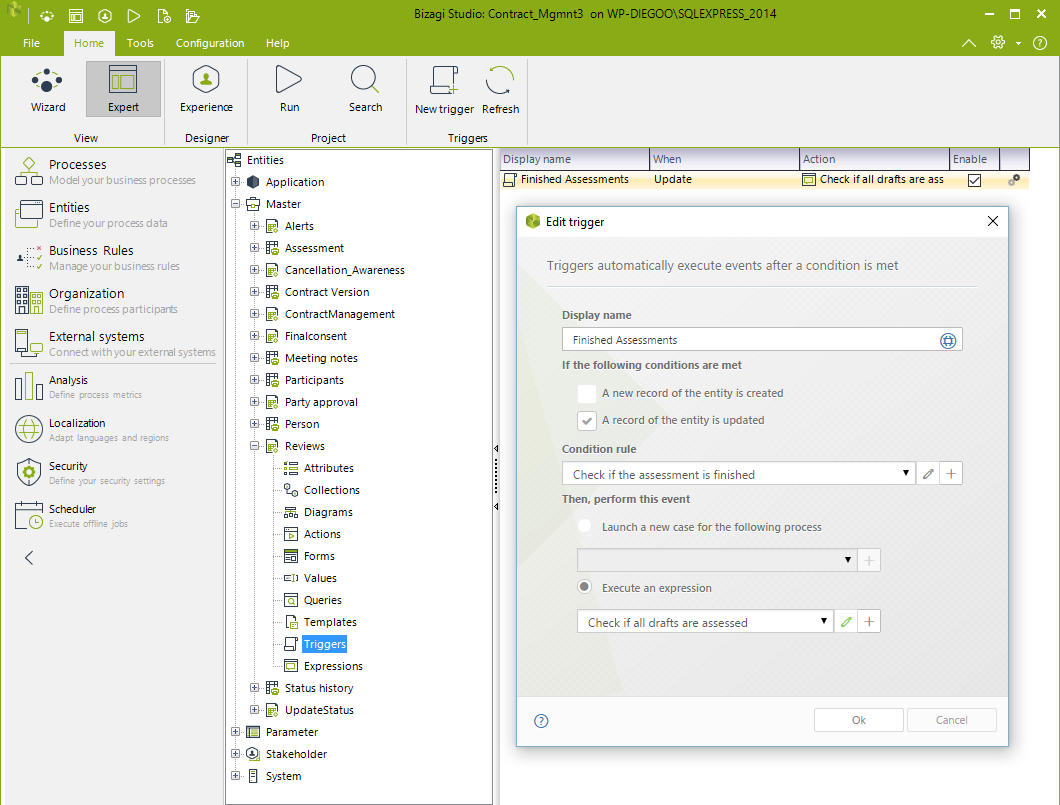
First, we use an expression at the end of all Assess draft processes, stating they are finished. When each of them is finished, the Trigger is launched and analyzed:
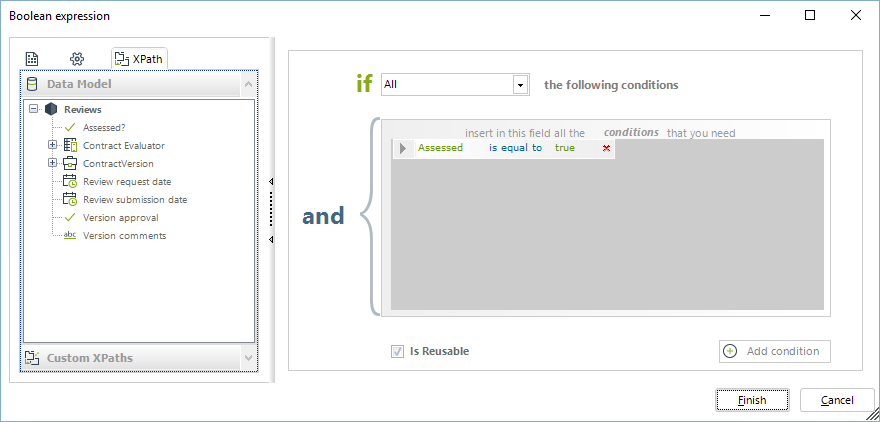
If the assessment is indeed finished, the Trigger performs the expression Event to review if all related assessments of the contract version have been finished.
If at least one of them is not finished, the ContractManagement.Currentversion.AllReviewsFinished attribute will remain in false.
However, as soon as they are all finished, the ContractManagement.Currentversion.AllReviewsFinished attribute will be true and the All approbations finished conditional activity is enabled, continuing the process.
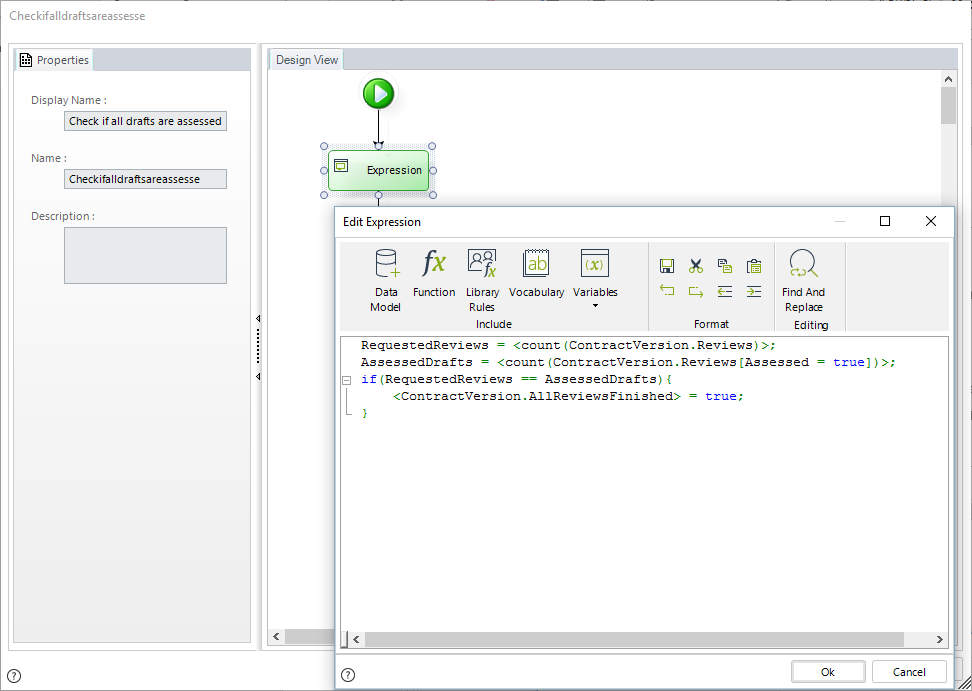
Last Updated 12/3/2025 5:29:01 PM